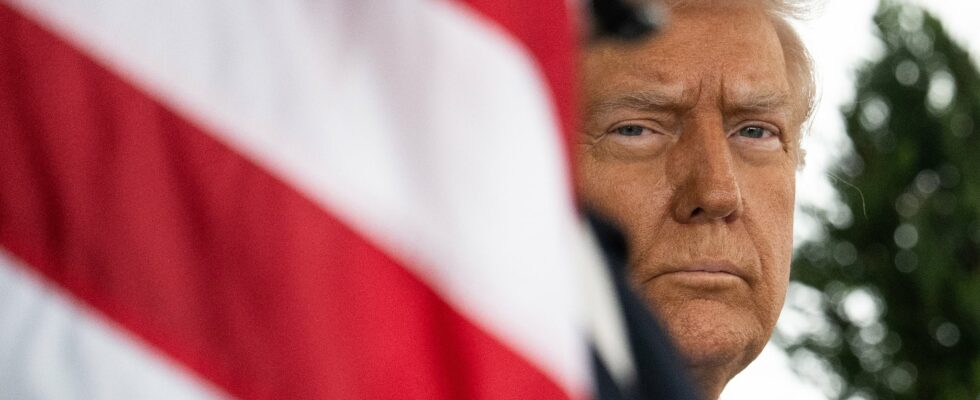The tenant of the White House rises with a notch in his trade war. Wednesday, February 12, Donald Trump said he would impose reciprocal customs duties on all countries that do the same with American imports. “I may do it later or tomorrow morning, but we will sign these reciprocal customs duties,” insisted the tenant of the White House to journalists. The next day, the Head of State wrote in capital letters on Truth Social : “Three beautiful weeks, perhaps the best never lived, but, this time, it’s the big day: reciprocal customs duties!”
Reciprocal customs duties are part of the ex-billionaire campaign promises. Indeed, he had quickly referred to it, by taking over the law of the Talion to readjust it in his own way: “Eye for eye, customs duty for customs law, exactly the same amount.” Through this economic crusade, Donald Trump wishes to make trade more “equitable” and contribute to put an end to years of “swindle” of the United States by foreign countries. Asked about CNBC, the main economic advisor of the White House, Kevin Hesset, confirmed the idea, stressing that “if we are taxed at 20 %, we should be able to do it, and if the customs duties drop, we Lower “.
But what will be the extent of this measure? The Republican President of the House of Representatives of the United States, Mike Johnson, insinuated that he thought that Donald Trump was considering exemptions that would include, among other things, the automotive and pharmaceutical industries, without being certain. “I think this will be country by country,” said Republican senator Eric Schmitt, an ally of the president. Reciprocal customs duties will be a “negotiation tool”, he added, but will also be used to generate revenue in order to compensate for the expected renewal of Trump tax reductions.
A threat to India
Note that this umpteenth attack comes when the Indian Prime Minister Narendra Modi is expected at the White House this Thursday. However, the Asian giant, populated by 1.5 billion inhabitants, could be hardly struck by these reciprocal customs rights, as are other developing countries, in particular Brazil, Vietnam and other countries of ‘Southeast and Africa Asia. In 2022, the average customs duty in India was around 10 %, against 3 % in the United States, according to the World Bank data.
Already scalded by the announcement of customs duties of 25 % on steel and aluminum exports, Narendra Modi will undoubtedly try a demining operation, hoping to pass between the meshes of the net. It remains to be seen whether the warm relationship maintained with Donald Trump will be able to benefit from him on the economic level. Last year, India exported $ 87 billion in the United States for $ 87 billion, while Washington exported $ 42 billion in goods, according to data from the Trade Department, taken up by the New York Times.
More broadly, reciprocal customs duties are part of a series of commercial measures that Donald Trump has used since he entered. “Reciprocal customs duties would constitute the last measure taken by the president to rethink American trade relations,” reacts the New York Times.
The risk of weighing down the American portfolio
Except that the burden on customs duties could ultimately fall on American consumers, say economists. Indeed, taxed importers could affect costs on sellers who then increase prices for consumers. Just import taxes on Chinese, Mexican and Canadian products would be equivalent to weighing down the average American household basket of 1,200 euros per year, according to the calculations of the calculations Peterson Institute for International Economic.
One thing is certain: the imposition of reciprocal customs duties would mark a break with the global trade standards in force. According to some commercial experts, interviewed by the Wall Street Journalreciprocal customs duties would dilute the concept of the World Trade Organization (WTO). This action “would largely annihilate the reason why we have created the WTO,” said Christine McDaniel, former assistant Treasury secretary under the administration of George W. Bush.
Finally, what if the objective was more diplomatic? It is a question of “creating uncertainty to make it a negotiation tactic. But uncertainty is a form of corporate tax”, responds to AFP Jeffrey Schott, researcher at the Peterson Institute for Reflection Center International Economics. The goal would be to use, once again, customs duties to obtain other advances that Donald Trump believes beneficial for his country, such as encouraging European countries not to position themselves on the mining resources present in Ukraine , or push them to buy more American liquefied natural gas.
